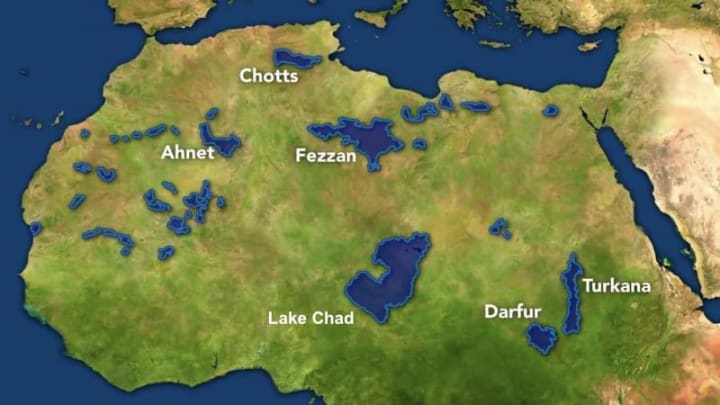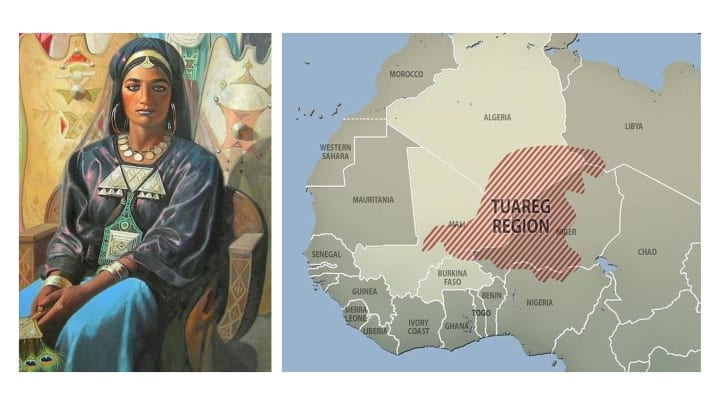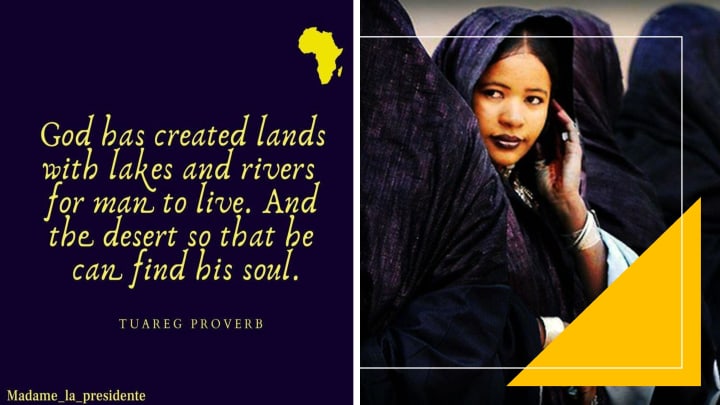The Beautiful Tuareg Women of North & West Africa
Tuareg women don’t wear the veil because men “want to see their beautiful faces.”

The Tuareg people are in North and West Africa (the Sahara and Sahel regions). They are found in present-day Mali, Libya, Algeria, Niger, Northern Nigeria, and Burkina Faso. They are a tribe of Berber origins and are semi-nomadic pastoralists that dominated the central and southwestern region of the Sahara. They are also known as “the veiled ones” because of the veils they wear due to their following of Islam. The veils also protected them against the desert sun and sand. The Tuareg are also known as the “Blue People” or “blue men of the Sahara Desert” because of the indigo dye of their clothing that rubbed off and stained their skin. The veils are manly worn by the Tuareg men. They acted both as a turban and a veil that covered the nose and mouth.
The Sahara is the largest hot desert in the world, and the third largest overall after Antarctica and the Arctic. The Sahara covers 9.2 million km, which is almost the same size as China, and a total of 8% of the earths land area. The Tuareg live in the hottest desert in the world, with one of the harshest climates. The area receives little rainfall, and half of the Sahara receives less than one inch of rain every year.
The Sahara is much more than just sand, because much of the Sahara is made up of barren, rocky plateaus, along with salt flats, sand dunes, mountains, and dry valleys. The rivers and streams found in the Sahara are seasonal, apart from the Nile River. There are over 20 lakes in the Sahara, most of which are saltwater lakes. Lake Chad is the only freshwater lake in the Sahara. Despite many people thinking the Sahara is a constantly hot climate, temperatures drop dramatically at night, due to lack of humidity. Snow even falls on several mountains ranges but know where else in the Sahara.

During ancient times, it was the Sahara where the first African migrations began before written history. The Sahara was known as the largest northern region of “Bilad as Sudan,” or the “Land of the Blacks” (i.e., Africa: Alkebu-lan, land of the Spirit People). This vast area, bigger than the United States of America, for at least 5,000 years was once a land of lakes, rivers, forests, green fields, farms, villages, towns, and cities. Wildlife was once abundant in this area of Africa where cattle grazed meadows, and horse-drawn chariots sped over highways. The Sahara was a great land, and only a part of an even greater Black world during ancient times.


Tin Hinan is the name given by the Tuareg to a 4th century woman of prestige whose monumental tomb is in the Sahara at Abalessa in the Hoggar region of Algeria. Queen Tin Hinan is credited as the first leader and founding monarch of the Tuareg people. Queen Tin Hinan is revered as “the Mother of us all.” The tomb of Queen Tin Hinan was opened by Byron Khun de Prorok with support of the French army in 1925, and archaeologists made a more thorough investigation in 1933.
The Tuaregs are not divided into several confederations, but into an infinite number of tribes. The name Tuareg, which is said to signify “the abandoned” (of God), has been given to them by the Arabs, but they call themselves Imahagh, or Imasharsh, or Imajirhen, and their language they designate by the name of Tamachek (Tamacheq).

Today, the Tuaregs speak many different languages like Songhay (Songhai), Hausa, French, and Arabic, but their main language is Tamacheq.
The Tuaregs are gifted with an independent spirit, hate oppression, and never allow themselves to be ruled by an oppressive power. When Tuareg men start out on a long journey they entrust the honor of their house to a friendly neighbor, who will avenge any insult offered to the family of his absent friend with greater rigor than he would have done if the affair concerned himself. According to James Richardson, author of Travels in the Great Desert of Sahara II, when he encountered a Tuareg man, the Tuareg man told him he doesn’t uncover his face and go up to his wife and stare boldly at her. His face is covered all over, and he sits down gently by her side, waiting till she speaks with all patience. When she speaks, the Tuareg man speaks because he knows then that his wife is ready to speak to him. It is very indecent for Tuareg men to go to their wife with their face uncovered.
The Tuareg women are placed on equal footing with their men, according to Americus Featherman, author of Social History of the races of Mankind V: Aramoeans- - TUAREGS. Young Tuareg girls receive the same scholastic education as the boys; and a young woman is perfectly free to make a choice of the young man she wishes to marry, and her parents only interfere to prevent an unsuitable match. Tuareg wives have an exclusive right to manage their private fortune without being compelled to contribute a part of their revenues for the support of the family. In their domestic establishments they are principally occupied with the nursing and education of their children, who follow the rank and tribe of their mother. Tuareg wives are at full liberty to devote their time to reading, writing, music, or embroidery (i.e., sewing). By the legal condition of marriage, the wife owes obedience to her husband, and the husband is, in turn, required to provide for the wants of his wife within the limits of his resources.
Heinrich Barth, author of Travels and Discoveries in North and Central Africa I, said it would be better for a Tuareg traveler in the region of North and West Africa, both for his own comfort and for the respect felt for him by the natives, if he could take his wife with him, because Tuareg men do not understand how a man can live without a partner.
“The Tuareg men give their women a deep respect and maintain an attitude of deference towards them. The man does not marry to ‘use’ his wife as an object, but to start a family. The husband surrounds her with care and affection.” – Bob Idjennaden
Sources:
Afrika Africa. Tuareg woman. Mali. Afrika Africa. Tumblr. 2014. May 31, 2023. https://africaafrika.tumblr.com/post/88554704304/tuareg-woman-mali
Battle, R., Robinson, C., Robinson, E. The Journey of the Songhai People. Pan African Federation Organization; 2nd edition. (June 1, 1992). June 3, 2023. p. 15, 285.
Captivating History. The Songhai Empire: A Captivating Guide to One of the Largest States of Medieval West Africa (Western Africa). Captivating History. March 4, 2022. May 21, 2023. p. 25.
Chrissystewart. Pinterest. Chrissystewart. May 31, 2023. https://www.pinterest.com/pin/690739661622433322/
Drury, F. Sex and the Sahara: Striking photographs of the mysterious Islamic tribe where women embrace sexual freedoms, dictate who gets what in divorce and don’t wear the veil because men ‘want to see their beautiful faces.’ Daily Mail. Jan. 31, 2016. May 31, 2023. https://www.dailymail.co.uk/news/article-3131511/Sex-Sahara-Striking-photographs-mysterious-Islamic-tribe-women-embrace-sexual-freedoms-dictate-gets-divorce-don-t-wear-veil-men-want-beautiful-faces.html
Firnās, a. Africa Through the Eyes of the Other: A Collection of Observations made by European Colonizers, Explorers, and Missionaries in regard to the Tuareg. abū Firnās. Jan. 19, 2023. May 31, 2023. p. 27, 43-44, 58-60, 70-71.
Global Adventure Challenges. Our Latest News and Stories From Our Adventures. Global Adventure Challenges. May 31, 2023. https://www.globaladventurechallenges.com/journal/facts-about-sahara-desert
Idjennaden, B. The Tuareg (The Forgotten Civilizations of Africa Book 4). Bon Idjennaden. Sept. 19, 2013. May 31, 2023. Location: 226.
Oguike, N. Trail Africa: 5 Things You Should Know About The Tuareg People. Style Rave. Feb. 1, 2023. May 31, 2023. https://www.stylerave.com/5-things-about-the-tuareg-people/
Presidente, M. Find your truth in silence, in solitude. Madame la Presidente. Pinterest. May 31, 2023. https://www.pinterest.com/pin/690739661622413629/
Rey, S. Queen Tin Hinan of the Tuareg People. Sola Rey. May 15, 2015. May 31, 2023. http://solarey.net/queen-tin-hinan/
Sahara DZDZ. Pinterest. Sahara DZDZ. May 31, 2023. https://www.pinterest.com/pin/690739661622538137/
Vaucher, J. Sahara Humid Periods. umontreal. Jan. 2021. June 3, 2023. http://www.iro.umontreal.ca/~vaucher/History/Evolution/Climate/Green.html
Williams, C. The Destruction of Black Civilization: Great Issues of a Race from 4500 B.C. to 2000 A.D. Third World Press; 3rd Revised ed. edition. (Feb. 1, 1992). May 31, 2023, p. 195.
About the Creator
Darryl C. Richie
Inspirational Speaker, Author and Blogger looking to inspire with my story of being a two-time cancer survivor and hip amputee, and connect the African Diaspora to their African roots via Black Consciousness.
Enjoyed the story? Support the Creator.
Subscribe for free to receive all their stories in your feed. You could also pledge your support or give them a one-off tip, letting them know you appreciate their work.






Comments
There are no comments for this story
Be the first to respond and start the conversation.